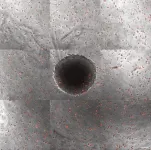(Press-News.org) A new Kaiser Permanente physician peer support program designed to reduce burnout helped improve doctors’ well-being and had a positive impact on the culture of the medical departments that took part in the program, Kaiser Permanente researchers found.
The study, published November 1 in PLOS ONE, analyzed the impact of the Kaiser Permanente Northern California (KPNC) Peer Outreach Support Team (POST) program in 2 KPNC hospitals. POST is now active in 10 KPNC hospitals, and 3 more hospitals intend to launch POST programs over the next few months. Uniquely, the POST program allows for third-party referrals — a process that permits physicians to refer other physicians — which helps bring a culture of support into the hospital setting.
“Peer support allows the recognition of and remedy to the moral injury that physicians experience when they feel they can’t be fully themselves, adhere to their own values, or do enough for a patient due to constraints within health care,” said first author Molly L. Tolins, MD, an emergency medicine physician with The Permanente Medical Group (TPMG) and POST’s founder and regional director.
Between June 2019 and May 2022, 11 departments in 2 KPNC hospitals implemented the POST program, reaching more than 500 physicians. Over those 3 years, 306 POST interactions took place, with each lasting a median of 60 minutes. Nearly 85% of the survey respondents said they would recommend the program to another department. One Kaiser Permanente physician who received peer support through the program said, “[This program] has the potential to positively change the culture of medicine in general…”
“It’s important that rather than having outside clinicians provide support, we are getting peer support from our colleagues who understand the environment we work in and who experience the same challenges,” said senior author Dana Sax, MD, a Kaiser Permanente Division of Research adjunct investigator and TPMG emergency medicine physician who works at one of the hospitals where the program was started. “We hope that sharing our experience implementing the program and our findings on the study’s effectiveness will encourage similar programs to be more widely adopted.”
END
Physician burnout reduced with peer support, study finds
2023-11-15
ELSE PRESS RELEASES FROM THIS DATE:
WhaleVis turns more than a century of whaling data into an interactive map
2023-11-15
Even though they’re the largest animals on earth, whales remain difficult to track. So experts often turn to historical whaling data to inform current research. A dataset maintained by the International Whaling Commission (IWC) contains detailed information on commercial whale catches — more than 2.1 million records, predominantly from 1880 until the IWC banned whaling in 1986. Yet for researchers, distilling that data can prove its own challenge.
A team at the University of Washington has created an online interactive map called WhaleVis, which lets whale researchers visualize ...
Forget social distancing: House finches become more social when sick
2023-11-15
Social distancing when sick has become second nature to many of us in the past few years, but some sick animals appear to take a different approach. A new study of house finches led by Marissa Langager, a Ph.D. student in the Department of Biological Sciences in the College of Science, uncovered a surprising result. Unlike other social animals who passively or actively isolate themselves when sick, this gregarious backyard bird species gravitates toward healthy flock mates when they are sick, even ...
Microorganisms living in gastrointestinal tracts may foretell diagnoses of debilitating diseases including Alzheimer’s and Parkinson’s
2023-11-15
Nov. 15, 2023
Media Contacts:
Emily Gowdey-Backus, director of media relations
Nancy Cicco, assistant media relations
The trillions of microorganisms living in gastrointestinal tracts may foretell diagnoses of debilitating diseases including Alzheimer’s and Parkinson’s
Microbiome may hold clues that could revolutionize diagnosis and treatment
Researchers at UMass Lowell’s Zuckerberg College of Health Sciences are exploring how the gut microbiome contributes to the risk of Parkinson’s and Alzheimer’s diseases. This research could lead to earlier detection and new treatments for people with those diseases, which ...
Longitudinal characterization of behavioral, morphological and transcriptomic changes in a tauopathy mouse model
2023-11-15
“Here we used the PS19 (P301S) mouse model of tauopathies to characterize longitudinal changes in behavioral, morphological, and transcriptomic levels.”
BUFFALO, NY- November 15, 2023 – A new research paper was published on the cover of Aging (listed by MEDLINE/PubMed as "Aging (Albany NY)" and "Aging-US" by Web of Science) Volume 15, Issue 21, entitled, “Longitudinal characterization of behavioral, morphological and transcriptomic changes in a tauopathy mouse model.”
Neurodegenerative ...
Two Sandia National Labs researchers elected associate fellows for aerospace contributions
2023-11-15
ALBUQUERQUE, N.M. — Two Sandia National Laboratories employees will soon join the American Institute of Aeronautics and Astronautics class of 2024 as associate fellows.
“This distinguished group of professionals has made significant and lasting contributions to the aerospace profession,” said AIAA President and Sandia Deputy Laboratories Director Laura McGill. “They exemplify expertise and dedication to excellence in advancing their specific technical disciplines. They are truly shaping the future of aerospace, and we are proud of their achievements.”
Michael Ross
Michael Ross was recognized for his work in ...
UTHealth Houston researcher receives NIH subcontract to study effects of integrated palliative care on Parkinson’s, related dementia
2023-11-15
A five-year, $3.9 million grant to study the effects of integrated palliative care on health service outcomes and disparities in Parkinson’s disease and Parkinson’s disease dementia has been awarded to UTHealth Houston and other institutions by the National Institute of Neurological Disorders and Stroke, part of the National Institutes of Health.
As part of the grant, Adriana Pérez, PhD, professor in the Department of Biostatistics and Data Science with UTHealth Houston School of Public Health ...
Shape-shifting immune cells offer new insights into cancer immunotherapy
2023-11-15
Macrophages, a type of white blood cell that can destroy invading pathogens, have an innate ability to infiltrate tumor cells, making them a potentially important tool in treatments that use transplanted cells to fight disease, known as cell therapy. In the lab, macrophages show a lot of promise in treating cancer but so far, clinical trials have been a disappointment and biologists are trying to figure out why.
But what if it’s not a biological problem?
In a recent paper, researchers from the Harvard John A. Paulson School of Engineering and Applied ...
All aquatic species in river mouths are contaminated by microplastics
2023-11-15
All aquatic species in the river mouths flowing into the Mediterranean Sea and Atlantic Ocean are contaminated with microplastics, with molluscs being the most affected due to their ability to filter water. Rivers are one of the main sources of pollution by microplastics (5 to 0.0001 mm in size) and nanoplastics (smaller than 0.0001mm) in the oceans. Estuaries, as transition zones between rivers and the sea, are major hotspots for the accumulation of these particles, which are retained in sediments. They pose a threat to aquatic ecosystems given their ability to capture harmful chemicals from the surrounding environment, ...
Smaller hippocampus linked to cognitive decline
2023-11-15
MINNEAPOLIS – With the rise of new drugs that can target the amyloid-beta plaques in the brain that are an early sign of Alzheimer’s disease, new ways are needed to determine whether memory loss and thinking problems are due to Alzheimer’s disease or another neurodegenerative disorder. A new study published in the November 15, 2023, online issue of Neurology®, the medical journal of the American Academy of Neurology, shows that shrinkage in the hippocampus area of the brain is associated with cognitive decline, even in people who don’t have amyloid plaques in the brain. The hippocampus plays a role in memory.
“These results suggest ...
ECOG-ACRIN and PrECOG announce multiple presentations at the American Society of Hematology (ASH) 2023 annual meeting
2023-11-15
Researchers with the ECOG-ACRIN Cancer Research Group (ECOG-ACRIN) and PrECOG, LLC, will present six oral and three poster presentations at the 65th American Society of Hematology (ASH) Meeting & Exposition, occurring in San Diego, California and virtually December 9-12, 2023. The presentations focus on treatments for acute leukemias and lymphomas.
Among the data are the promising results of the phase 2 PrE0405 trial, which evaluated bendamustine, rituximab, and venetoclax for the initial treatment of mantle cell lymphoma in older patients. Other ...







